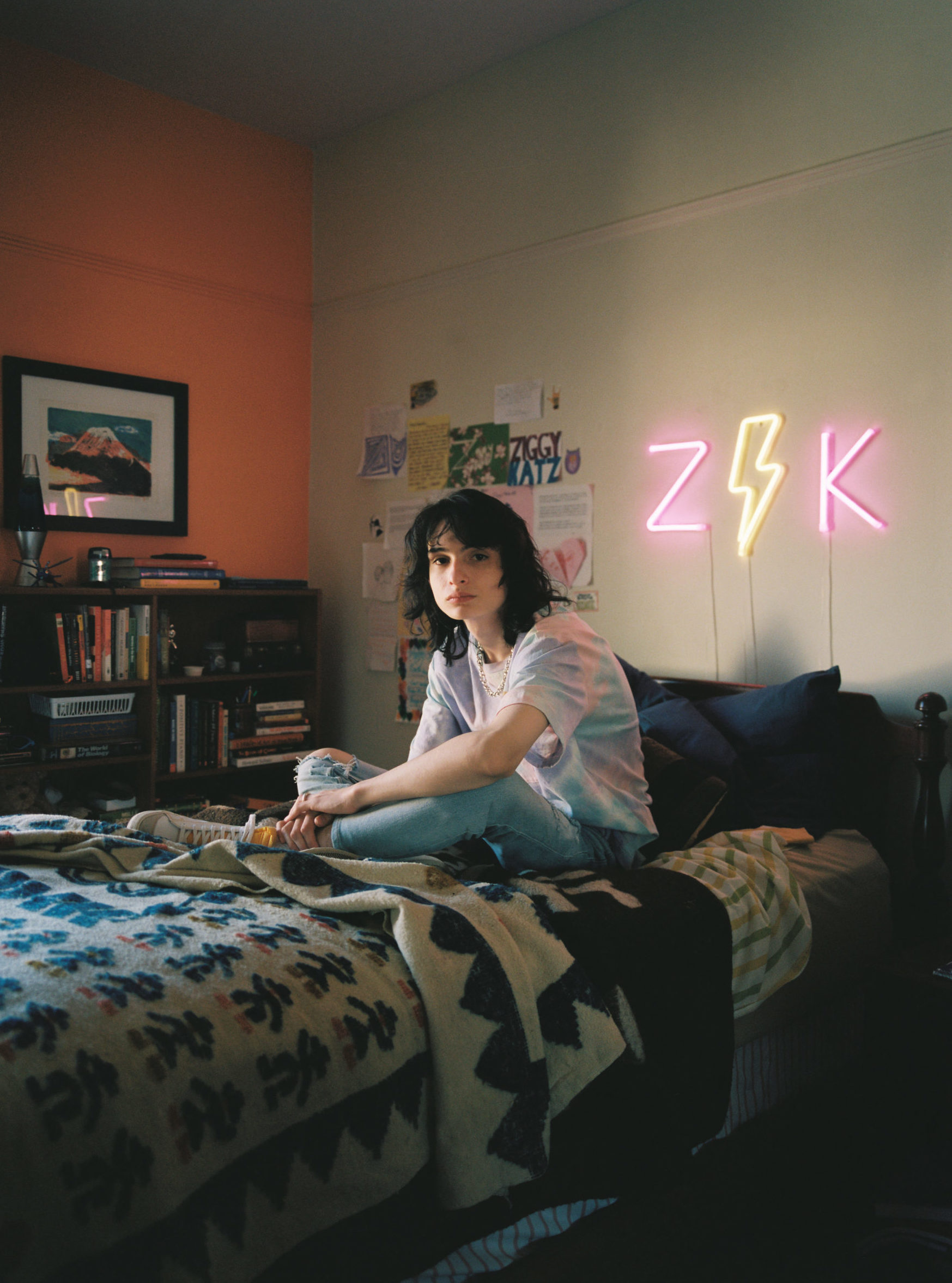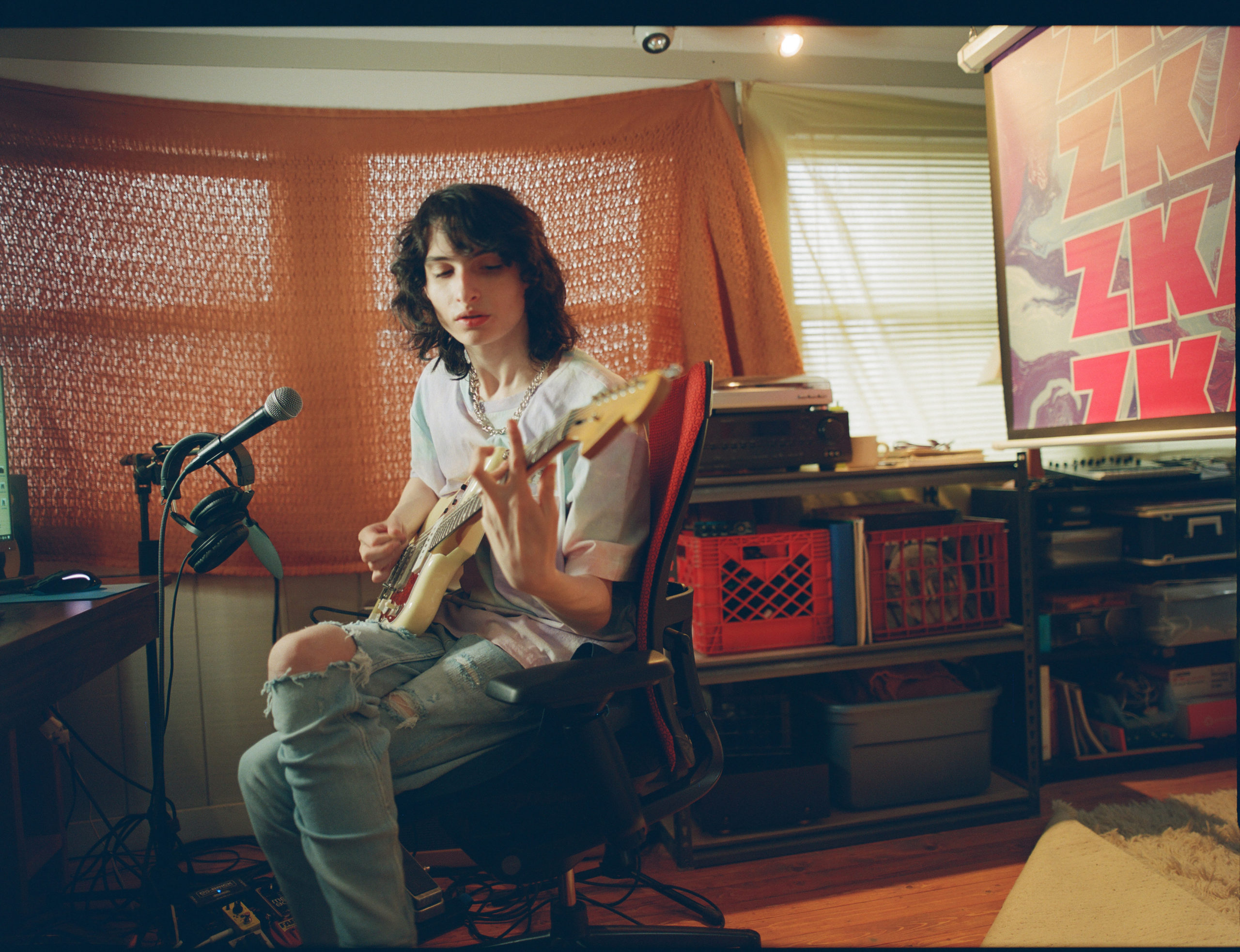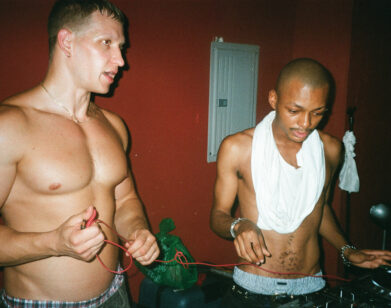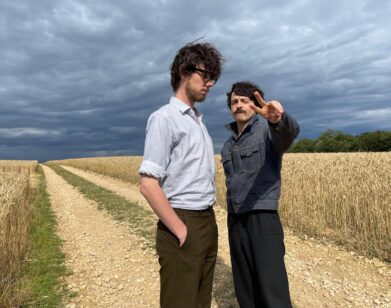IN CONVERSATION
Finn Wolfhard and Jesse Eisenberg Reflect on Their SNL Ambitions
Earlier this month, budding sensation Ziggy Katz dropped his newest single “Pieces of Gold,” a track perhaps best represented by its moody union of indie-folk and ad-libbed vocals, with not-so-subtle undertones of adolescent longing. “Two high speed cars on parallel streets—never gonna crash, never gonna meet,” he sings, strumming away at an acoustic guitar. There’s just one thing to know about Ziggy—he’s not exactly real. Not in the way his idols John Lennon or Bob Dylan are, anyway. Ziggy Katz, the angsty teenage son of disconnected mother Evelyn Katz (Julianne Moore), is a creation of Jesse Eisenberg in his directorial debut, A24’s When You Finish Saving the World. Ziggy is played by none other than Stranger Things’ Finn Wolfhard, the 20-year-old behind the character’s earnest ballads and boyish naïveté. Throughout the film, his and Evelyn’s inability to relate to one another leads each in pursuit of nonsensical relationships. Looking back on writing the film, Eisenberg connected with Wolfhard to compare their earliest roles, bygone Saturday Night Live ambitions, and being typecast as nice guys.—AVA MANSON
———
JESSE EISENBERG: Okay. So, we have spent the last two days being interviewed.
FINN WOLFHARD: Mhm.
EISENBERG: Now, we are interviewing each other. I have only thought of answers and no questions.
WOLFHARD: I truly have nothing. Okay, wait. Hold on. Let me think of one. Do you think you would’ve played this role that I’m playing in your movie when you were my age?
EISENBERG: That’s a wonderful question. It would be a role that I would have wished to play and not been cast in.
WOLFHARD: You think so?
EISENBERG: Yes. Because when I was younger, I was very, very eager to play inarticulate, un-self conscious people.
WOLFHARD: More confident people?
EISENBERG: Or just not self-aware. I was playing very self-aware characters who are very articulate. And I still do, but I also find parts that are not that now. But no, at the time I would’ve given anything to play a character that was not super bright and self-aware. When I was writing this, I was in some ways aspiring to play it. Not to literally play it, but when you’re writing it, you get into the spirit of the voice because it’s something that was fun for me to explore, and different. You also play the roles that I just described. Very bright, self-conscious.
WOLFHARD: People that are more self-aware.
EISENBERG: Yeah. Can I turn the question to you? Did you aspire to play this almost arrogant but also insecure or un-self-aware guy?
WOLFHARD: It was a role that I hadn’t ever played before. It just felt right to me, for whatever reason. First of all, I loved your writing so much. And on top of that, I felt the character was like me. I don’t know why. Because I’m not as—what’s the word? I try not to be as pompous or arrogant as Ziggy is. But for whatever reason, I felt very similar. Even though I have a good relationship with my parents and all that stuff, it was the first role that I played where I really felt a part of that kind of thing. I also thought it was going to be really funny, too. What also drew me to it was that I found it completely satirical. And also how many kids that I know actually talk like that. And sometimes I talk like that.
EISENBERG: Something that comes to my mind is that when I met you in Vancouver, I was surprised that you’re a real fan of alt-comedy. Unusual, obscure comedy.
WOLFHARD: Yes.
EISENBERG: I was surprised because when I watch you as an actor, you have this very genuine earnestness. And I thought, “Oh, somebody who has an interest in that kind of comedy would be pushing comic elements.” I noticed you didn’t do that in your acting. So, I’m wondering, are you conscious of the fact that you like this kind of comedy, but yet when you’re doing a certain character or style of performance, it really requires something else?
WOLFHARD: I can coexist with it, I think. I think it would be looking like I would be trying too hard if I really tried to play a character like—
EISENBERG: To play the satire of the comedy, the character?
WOLFHARD: Yeah. I think that there’s only so much that I can do as an actor that isn’t at least a part of me, if that makes any sense. I can’t really go full-blown like Tim and Eric, or any of that stuff. While I think it’s some of the funniest comedy in the world and I respect it so much, I would hope that I could live alongside it. I think there’s specific stuff that I can be a part of, but I just don’t think I’m fully that kind of performer.
EISENBERG: Yeah, completely agree. When I was younger, I wanted to be on Saturday Night Live.
WOLFHARD: Me, too.
EISENBERG: I wrote a portfolio that I submitted. It’s funny because in some ways you follow your taste, and in other ways, the entertainment industry tells you what you’re good at.
WOLFHARD: Yeah, yeah.
EISENBERG: I would get into roles that were sincere dramas. And yet–
WOLFHARD: All you wanted to do was–
EISENBERG: Broad comedy.
WOLFHARD: Me too.
EISENBERG: Really?
WOLFHARD: Yeah.
EISENBERG: In some way, it was like the entertainment industry told me, “Hey, this is what you can do well.”
WOLFHARD: “This is your lane.” Yeah.
EISENBERG: You’re the same. I think maybe we’re similar performers in that way, in that we prize the real feelings that the character has over everything else.
WOLFHARD: Rather than trying to play the joke up. Because some people can do that so well.
EISENBERG: I know.
WOLFHARD: Again, I wanted to be a cast member on SNL. That’s all I wanted to be. I took a few improv classes when I was a kid and all that stuff. And then realized that I just don’t have—if I wanted to be on SNL, then I would’ve just had a completely different path.
EISENBERG: Of course.
WOLFHARD: You know what I mean? And that’s the other thing. I would’ve never been on SNL, because I don’t think it’s who I am, really.
EISENBERG: Of course. The first movie I really auditioned for and screen-tested for that was a big movie called EuroTrip. Did you see it?
WOLFHARD: Yeah, of course.
EISENBERG: The guys who wrote it were these really brilliant guys. They write Curb Your Enthusiasm. They had just finished writing on Seinfeld a few years prior to making that movie. I was just desperate to be in it. It was very funny. It’s broad comedy, and the script was hysterically funny. I remember being in the audition thinking, “I can’t do these jokes that well. I can’t do these scenes in a way that’s that funny.” The guys at the screen test indicated that exact thing to me—that I was too emotionally sullen in my audition for these really broad comic scenes.
WOLFHARD: I did an audition of The Pandemic and was told that I was “too nice”. To my face.
EISENBERG: You mean your face is too nice?
WOLFHARD: No, no. I was told that I was too nice, to my face, for the role.
EISENBERG: That’s a compliment.
WOLFHARD: No, it is a compliment, but it was a weird thing where the character that I had to play had to be such an evil asshole.
EISENBERG: Oh, I see.
WOLFHARD: I don’t know if I’m either not capable of it or couldn’t bring myself to do it, but I couldn’t go there.
EISENBERG: Which is interesting because we are in the only profession where you can lose a job for being nice.
WOLFHARD: Yeah, exactly.
EISENBERG: I also want to mention you’re an amazing musician, and you play music so incredibly well in this movie. In fact, there was a period of time when it looked like you might not be able to do this movie because of scheduling and we had to audition some really wonderful actors. I even heard from this wonderful, wonderful actor—he was taking guitar lessons to try to be able to do the role. Then your schedule shifted, and you were able to do the movie. I remember being on set and being so thankful that this wasn’t an obstacle that we had to constantly contend with—that the actor doesn’t actually know how to play guitar. And not only were you great, but you’re better than what the character needs to be. It was perfect. I was wondering, A) have you ever done that before in a film? B) Is it something that you enjoyed doing? And then C) If you could just talk about how it made you feel a little more comfortable in the role. Because it’s something you’re clearly an expert in.
WOLFHARD: Definitely. I just know the stuff that I like to play over and over again, but thanks. I think, weirdly, there’s this thing, and I feel the same way whenever I’m walking around plunking something at my house, a ukulele or something to fidget with. There’s something about me, I don’t know what it is but I’ve always felt this way, where I am very, very calm when I’m playing music. If I’m playing the piano, I’m only focusing on the piano. I have no thoughts running through my head. The only time in the day when I don’t have a million thoughts running through my brain and I think that the world’s going to explode, it’s when I’m playing music. It weirdly gave me this comfortability while in the movie, because I felt like I could hide behind the guitar or any of the music stuff. I think that’s why I felt more comfortable behind it, as well.
EISENBERG: Right. Have you ever done it in anything before?
WOLFHARD: No. I had done little stuff, but never to this degree of involvement.
EISENBERG: Where it’s so central.
WOLFHARD: Yeah. But I definitely enjoyed playing all the music. Also, the house that we shot at was cool. It was falling apart, and Meredith [Lippincott] just remade it into this awesome bedroom. I was like, “I want this bedroom.” I went upstairs whenever I could and hung out in that little room and played guitar, like the character a little bit.
EISENBERG: That’s right. They had to cantilever the set to keep it stable because we were shooting on a house that had been-
WOLFHARD: Slanted, or something?
EISENBERG: Yeah, exactly.
WOLFHARD: The floor was…
EISENBERG: The floor was dipping, yeah. I don’t know what the technical term for something dangerous is.
WOLFHARD: Do you want to keep working with the same crew?
EISENBERG: Oh, yeah. Everybody in every position was the kind of thing where, “Oh, wow, I see who I would want to work with forever.” It was just great. The movie I’m about to do is in Poland, and we’re required, based on the technical aspects of working in Poland and where some of the financing is coming from, to hire a Polish crew. But if I’m doing a movie in America, of course. I’m friends with everybody. You’ve had some of those special experiences—I remember this from the first movie I was in, Roger Dodger, to our movie, of course—where you remember every single person on set.
WOLFHARD: Yes, I remember every single person.
EISENBERG: What do you think that is? What does that say about the experience you had? Because I think about that movie Roger Dodger all the time. This was 20 years ago. I remember every person in every job, and it’s so vivid. What do you think it is?
WOLFHARD: I think it’s that you can tell that everyone’s there for the same reason. I think everyone was just happy to be there. I don’t think anyone was bummed. I didn’t feel that at all.
EISENBERG: I think so, too.
WOLFHARD: I felt the crew was ready and having fun. It was right after the pandemic, so people were ready to get back to work and be a crew again.
EISENBERG: What’s the difference for you? Because you work on these massive things that people know you from, and yet I know you from working on the art house, indie thing. Do you notice a difference in your job and what you’re tasked with doing during the day?
WOLFHARD: More time, I guess. I don’t know. People seem less concerned with time when it’s a bigger budget.
EISENBERG: Like, if you miss a scene for the day, you go over on one scene and miss another, there’s a feeling we can get it in the next 25 weeks?
WOLFHARD: It feels a little more controlled, too. Maybe because there’s more of a crew and specific hours that people work.
EISENBERG: Do you feel more comfortable on the indie side for any reason?
WOLFHARD: I don’t really see a difference. Last season, I remember it was so amazing, but it was also a bummer because I just didn’t see anyone forever. You have your own little teams. It doesn’t feel as much of a contained thing anymore. You feel separated from everyone else. When everyone had their own storyline, every actor was like, “Oh man, I wish I was in so-and-so’s storyline,” or, “I wish I was in whatever,” because everyone just missed each other. Whereas, I guess when you’re on an independent film or a smaller film, you feel like it’s—
EISENBERG: It feels homemade.
WOLFHARD: Yeah.
EISENBERG: It feels like you’re working on every aspect. The thing I love about working on movies like this is I feel like I understand what other people are doing.
WOLFHARD: Yeah, because you can see what everyone is doing. It’s not 50 people on the crew, and you’re like, “Wait, who are those five people that just walked on the set?”
EISENBERG: Exactly.
WOLFHARD: “What are they doing? What’s their job?” You can literally see every single crew member doing their job.
EISENBERG: This is something I was curious to ask you. I find it hard to be on sets where I don’t know the people working with me. Sorry, what I mean is I find it difficult to be emotionally…
WOLFHARD: Available?
EISENBERG: Accessible on a set where I don’t know every member of the crew because it feels like such an uncomfortable thing to do. So, I get to know people very quickly and oftentimes personally.
WOLFHARD: You want to work with them again?
EISENBERG: Yeah, but also just so I feel comfortable doing my strange job in front of them. On an independent movie, I find that to be very easy and quick. On a bigger thing with lots of people, I find it very difficult to get to know everybody, and I feel a little strange and alienated from the comfort I feel about being emotional in front of other people.
WOLFHARD: I’d rather be working with the same group of people over and over again, for sure. I would rather that. I mean I love meeting new people as well, but as far as making stuff, I do like that more. Is that why you’ve done multiple movies with people that you know? Is that ever on purpose? Have you ever gotten a script and gone, like, “Oh, so-and-so should play this, that I already just did a movie with,” and then they agree?
EISENBERG: No, it’s been coincidental, which is strange. Have you done that, too?
WOLFHARD: I’m trying to think. I think with Billy [Byrk], we’ve been in a bunch of movies together, obviously. There was Ghostbusters and this. You did a few movies with Imogen [Poots], right? Or is it just one?
EISENBERG: Actually, that was the only time, where Imogen called me to do this movie Vivarium.
WOLFHARD: Right. And Kristen [Stewart] as well, you’ve done multiple movies with.
EISENBERG: I did movies with Woody Harrelson and Lizzy Caplan. Those were all by chance.
WOLFHARD: What were the other movies you did with Woody Harrelson?
EISENBERG: We did these magician movies.
WOLFHARD: Oh, right, Now You See Me. Yes.
EISENBERG: Different teams, magicians and stuff.
WOLFHARD: Or magician zombies. Oh, right. And Lizzy was in–
EISENBERG: She was in those movies.
WOLFHARD: The second.
EISENBERG: Exactly. Well done.
WOLFHARD: Trivia.
EISENBERG: Anyway, that’s my oeuvre. I think of you as so ahead of your time. I’m wondering, without you having to psychoanalyze yourself, do you think you’re representative of people your age, or are you unusual? I know it’s an unfair question to ask a person. But when I look at you, the last two days handling interviews, I’m in awe. I have to remind myself that you’re younger than me. Not that you’re a child, but you’re younger than me. I remember the ineptness I had. I remember doing an interview when I was 17, because I was on a TV series when I was younger, and I remember I was speaking in a smart way for a 17-year-old, and the guy who was taping it made fun of me after. He was like, “So smart, you should do my taxes,” or something. A sweet joke, but I felt a little bit–
WOLFHARD: Embarrassed?
EISENBERG: Yeah, embarrassed to sound smart and whatever. Anyway, I guess it’s unfair to ask you.
WOLFHARD: Is it just me?
EISENBERG: Are a lot of people as savvy as you now, and the generation is just different because you grew up with media?
WOLFHARD: I think so. I don’t know. Because now that anyone can just be famous because of social media and stuff, I think anyone just sees themselves as a business person.
EISENBERG: Therefore, they imagine themselves in a public way.
WOLFHARD: Sure. Everyone does, I feel like everyone my age does that. But I think I say “like” a lot. Over and over again.








